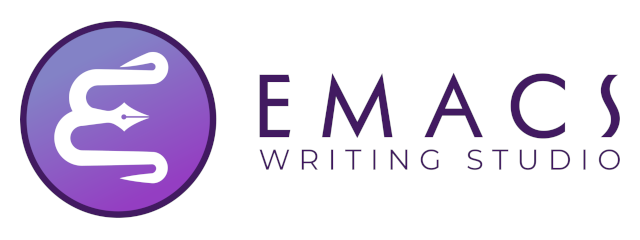Emacs Writing Studio (EWS) is a configuration for researchers and authors who want to use Emacs to write and publish articles, books and dissertations. EWS is also a forthcoming ebook and paperback, which is an expanded version of a series of articles on my website.
This configuration follows the following principles:
- Stays as close as humanly bearable to vanilla GNU Emacs
- Leverage functionality in Emacs 29
- Standard keyboard shortcuts
- No configuration for writing code
- Centred around Org mode
I am currently working on an Emacs Writing Studio book based on the website. The Org mode source code is available in the documents folder. The books is written with the EWS configuration and will be available as ebook and paperback when completed.
Feel free to raise an issue if you have any suggestions on how to enhance the configuration or like to see additional packages useful to authors.
To install the EWS configuration, download the init.el and ews.el files from the GitHub repository and save them in the configuration folder.
The location of the configuration folder depends on your operating system and Emacs version. Type C-h v user-emacs-directory to identify its location in the popup help buffer. You can close this buffer by pressing q.
Copy both files from the EWS repository to this directory. EWS will activate after you evaluate the restart-emacs function or the next time you start the program.
If you an experienced Emacs user, then you can try the EWS configuration by cloning this repository and start Emacs with emacs --init-directory <folder-path>. That way you can try EWS without clobbering your existing configuration.
Emacs is not only a text editor but also an interface to other software. EWS depends on external software that Emacs interfaces with to do various tasks.
When EWS starts, a message will appear in the *Messages* buffer listing the missing software. Some of the listed packages are alternatives for each other, for example (convert or gm). The core functionality of Emacs will work fine without these, but some specialised tasks require assistance from this software.
soffice(LibreOffice): View and create office documentszip: Unpack ePub documentspdftotext(poppler-utils): Convert PDF to textdjvu(DjVuLibre): View DjVu filescurl: Reading RSS feedsdot(GraphViz): Create note network diagrams- Convert image files
convert(ImageMagick)gm(GraphicsMagick)
latex(TexLive, MacTex or MikTeX): Preview LaTex and export Org to PDFdivpng: Part of LaTeX
hunspell: Spellcheck. Also requires a hunspell dictionary- Search inside files
grepripgrep: Faster alternative for grep
- View PDF files
gs(GhostScript): View PDF filesmutool(MuPDF): View PDF files
- Play music
mpg321,ogg123(vorbis-tools),mplayer,mpv,vlc
